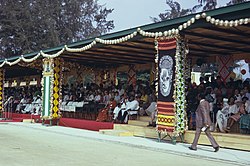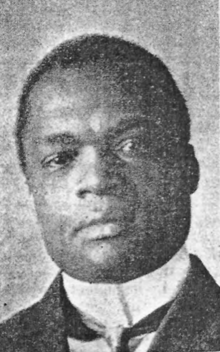Portal:Pan-Africanism
IntroductionWelcome to the Pan-Africanism portal!
Bienvenue sur le portail panafricanisme!   Pan-Africanism is a worldwide movement that aims to encourage and strengthen bonds of solidarity between all indigenous peoples and diasporas of African ancestry. Based on a common goal dating back to the Atlantic slave trade, the movement extends beyond continental Africans with a substantial support base among the African diaspora in the Americas and Europe. Pan-Africanism can be said to have its origins in the struggles of the African people against enslavement and colonization and this struggle may be traced back to the first resistance on slave ships—rebellions and suicides—through the constant plantation and colonial uprisings and the "Back to Africa" movements of the 19th century. Based on the belief that unity is vital to economic, social, and political progress, it aims to "unify and uplift" people of African ancestry. (Full article...) Selected articleAfrican philosophy is philosophy produced by African people, philosophy that presents African worldviews, or philosophy that uses distinct African philosophical methods. African philosophers may be found in the various academic fields of philosophy, such as metaphysics, epistemology, moral philosophy, and political philosophy. African philosophy can also be defined as any epistemic endeavor that attempts to understand the world from an African perspective. It is therefore not just about Africa but about the world even if the location of the subject is Africa. Selected biography
Henry Sylvester Williams (15 February 1869 – 26 March 1911) was a Trinidadian lawyer, councillor and writer, most noted for his involvement in the Pan-African Movement. As a young man he went to North America to further his education, and subsequently to Britain, where in 1897 he formed the African Association to challenge paternalism, racism and imperialism; the association aimed to "promote and protect the interests of all subjects claiming African descent, wholly or in part, in British colonies and other place, especially Africa, by circulating accurate information on all subjects affecting their rights and privileges as subjects of the British Empire, by direct appeals to the Imperial and local Governments." In 1900 Williams organised the First Pan-African Conference, held at Westminster Town Hall in London. In 1903 he went to practise as a barrister in South Africa, becoming the first black man to be called to the bar in the Cape Colony. Selected historyJim Crow laws were state and local laws that enforced racial segregation in the Southern United States. All were enacted in the late 19th and early 20th centuries by white Democratic-dominated state legislatures after the Reconstruction period, the laws were enforced until 1965. In practice, Jim Crow laws mandated racial segregation in all public facilities in the states of the former Confederate States of America, starting in the 1870s and 1880s, and were upheld in 1896, by the U.S. Supreme Court's "separate but equal" legal doctrine for facilities for African Americans, established with the court's decision in the case of Plessy vs. Ferguson. Moreover, public education had essentially been segregated since its establishment in most of the South, after the Civil War (1861–65). Selected culture
Haitian Vodou (/ˈvoʊduː/, French: [vodu], also written as Vaudou /ˈvoʊduː/; known commonly as Voodoo /ˈvuːduː/, sometimes as Vodun /ˈvoʊduː/, Vodoun /ˈvoʊduːn/, Vodu /ˈvoʊduː/, or Vaudoux /ˈvoʊduː/) is a syncretic religion practiced chiefly in Haiti and the Haitian diaspora. Practitioners are called "vodouists" (French: vodouisants [voduizɑ̃]) or "servants of the spirits" (Haitian Creole: sèvitè). Vodouists believe in a distant and unknowable Supreme Creator, Bondye (derived from the French term Bon Dieu, meaning "good God"). According to Vodouists, Bondye does not intercede in human affairs, and thus they direct their worship toward spirits subservient to Bondye, called loa. Every loa is responsible for a particular aspect of life, with the dynamic and changing personalities of each loa reflecting the many possibilities inherent to the aspects of life over which they preside. To navigate daily life, vodouists cultivate personal relationships with the loa through the presentation of offerings, the creation of personal altars and devotional objects, and participation in elaborate ceremonies of music, dance, and spirit possession. Vodou originated in what is now Benin Republic and developed in the French colonial empire in the 18th century among West African peoples who were enslaved, when African religious practice was actively suppressed, and enslaved Africans were forced to convert to Christianity. Religious practices of contemporary Vodou are descended from, and closely related to, West African Vodun as practiced by the Fon and Ewe. Vodou also incorporates elements and symbolism from other African peoples including the Yoruba and Kongo; as well as Taíno religious beliefs, Roman Catholicism, and European spirituality including mysticism and other influences. Selected imagesOrganisationsAll-African People's Revolutionary Party · African Society for Cultural Relations with Independent Africa · African Unification Front · African Union · African Queens and Women Cultural Leaders Network · Conseil de l'Entente · Convention People's Party · East African Community · Economic Freedom Fighters · Global Afrikan Congress · International African Service Bureau · International League for Darker People · Organisation of African Unity · Pan African Association · Pan-African Congress · Pan Africanist Congress of Azania · Rassemblement Démocratique Africain · Pan Africa Chemistry Network · Pan African Federation of Accountants · Pan-African Freedom Movement for East and Central Africa · Sahara and Sahel Observatory · UNIA-ACL · ZANU–PF
See also
& Festivals Photo by Helinä Rautavaara (1977) Publications
Films and TVAudios and videosDid you knowArchbishop Desmond Tutu and Thabo Mbeki, former President of South Africa. ... Selected quotesIn his "Whirlwind Message", the First Message to the Negroes of the World from Atlanta Prison (10 February 1925), Marcus Garvey delivered the following message:
Pan-Africanism topicsCategoriesThings you can do
Related portalsAssociated WikimediaThe following Wikimedia Foundation sister projects provide more on this subject:
Discover Wikipedia using portals | ||||||||||||||||||||||||||||||


































